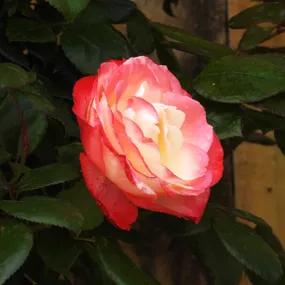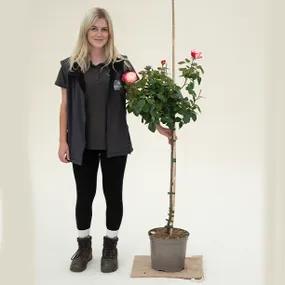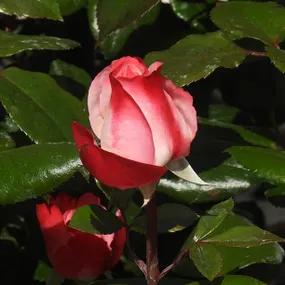'Nostalgia Hybrid' Tea Rose Bushes
Honest Delivery Prices- Group: Hybrid Tea
- Colour: Red and cream
- Height: 1m
- Scent: Sweet
- Flowering: Jun-Oct
- Size: 10cm
- Glossy leaves, attractive new growth
- Good for cutting
- RHS Award of Garden Merit
Recommended extras
Description
'Nostalgia' Hybrid Tea Rose Bushes
Nostalgia hybrid tea roses have unusual, eye-catching, large and full cream centred and cherry lipped flowers, looking like a sumptuous radish carved into a rose at a restaurant. It's an Award of Garden Merit holder for its disease free, glossy foliage and reliable repeating blooms from June to October. They have a light sweet scent and elegant long stems that're great for cutting and bringing indoors where they can be nosed up close. Its compact habit, reaching 75cm-1m tall is ideal for tight spaces and medium-sized pots.
Browse our range of roses.
Features
- Group: Hybrid Tea
- Colour: Cherry red and cream
- Height: 1m
- Scent: Sweet
- Flowering: June to October
- Size: 10cm
- Glossy leaves, attractive new growth
- Good for cutting
- RHS Award of Garden Merit
Growing Nostalgia Roses
Plant in fertile, well-drained soil, in full sun or very light shade. Mulch in spring with garden compost or manure, feed in early summer. Do not allow to dry out. Prune in late winter/early spring.
Planting companions for Nostalgia
With their large pointed flowers and compact bushy habit, hybrid tea roses are ideal for more formal gardens. A dedicated rose border is a great idea, where a stunner like Nostalgia can really shine. Or combine her with another cherry red hybrid tea, planting in drifts for the best effect. Plant a lavender hedge to surround them, or intersperse with long-flowering hardy geraniums to keep the colour coming.
Planting Instructions
How to plant Nostalgia Roses
Choose a spot with as much light as possible. Improve the soil from the hole by removing roots, weeds, large stones and other rubbish and mixing in about 25% by volume of well-rotted compost or manure.
Position your rose so its roots are spread out, wet them and sprinkle them with Rootgrow mycorrhizal fungi.
Then backfill the hole with mixed soil and compost, firming it gently as you go. Water in thoroughly.
Deadhead. Prune in late winter or early spring.
Watch a video on how to plant a bare-root rose here.
Did you know?
This exotic beauty was introduced in 1995 by Hans Jürgen Evers (1940-2007) of German rose breeders Rosen Tantau; the name in German is Nostalgie. It was bred as a hardy outdoor rose for cutting.
Founded in 1906 by Mathias Tantau, Rosen Tantau has come through two world wars, as well as a devastating hailstorm in 1925, which destroyed all their rose fields and greenhouses at a time when the company had no insurance, and Germany was suffocating economically under the sanctions imposed after the first world war.
Nostalgia, from the Greek for homecoming, nostos, and grief, algos, is a relatively modern word, first coined in 1688 as a medical term for the German word for homesickness, heimweh, (literally home-woe). By 1754, scientists recognised it as medical disorder that especially applied to Swiss people who, adapted to the Alpine air, were "overloaded in lower countries with an air more dense and heavier, which compressing and obstructing the capillary vessels, makes the circulation slow and difficult, and occasions many sad symptoms."

 1.webp)
 1.webp)



